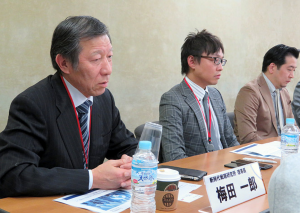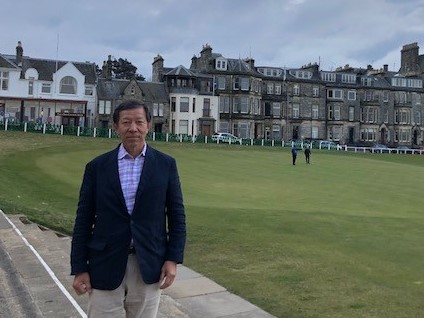― How did you come to study at GraSPP?
 I had been thinking for a few years prior to stopping work that I would like to knuckle down to study one more time. I am currently employed as Chairman of the Institute for New Era Strategy (INES), a think tank where we engage with the Ministry of Finance and the Ministry of Health, Labour and Welfare as well as researchers and politicians to debate and put forward policy proposals on the societal challenges facing Japan in the 21st century. While I have considerable business experience, having spent 38 years working for a global pharmaceutical company, I am always conscious of my lack of knowledge and understanding of fields such as economics and social security. It was when I looked around for somewhere to study that I discovered GraSPP. My interest was further piqued by attending a presentation for prospective students. When I looked into it after returning home, I found that I satisfied the criteria for taking the entry examination. Having resolved to take up the challenge, I subsequently sat the examination and was fortunate enough to pass.
I had been thinking for a few years prior to stopping work that I would like to knuckle down to study one more time. I am currently employed as Chairman of the Institute for New Era Strategy (INES), a think tank where we engage with the Ministry of Finance and the Ministry of Health, Labour and Welfare as well as researchers and politicians to debate and put forward policy proposals on the societal challenges facing Japan in the 21st century. While I have considerable business experience, having spent 38 years working for a global pharmaceutical company, I am always conscious of my lack of knowledge and understanding of fields such as economics and social security. It was when I looked around for somewhere to study that I discovered GraSPP. My interest was further piqued by attending a presentation for prospective students. When I looked into it after returning home, I found that I satisfied the criteria for taking the entry examination. Having resolved to take up the challenge, I subsequently sat the examination and was fortunate enough to pass.
― What was the reaction of those around you when you told them you were going back to study?
Everyone was very supportive, and my overseas friends thought it was wonderful and were envious of me. When I made my tuition fee payment, the teller at the bank was very surprised, saying “Are you really going back to university? Congratulations!” In Japan, opportunities for further study after graduating don’t go much beyond an MBA, and it is very rare for someone like myself who has been working for such a long time to go back to university. This is one area where I feel that Japan lags behind overseas countries.
― How are you getting on now that you have started at GraSPP?
To be honest, I was unsure at first about whether I could sit down and listen to a lecture for 105 minutes at a time. Once I started attending classes, however, I found all of the lectures to be fascinating. Many classes at GraSPP deal with case studies of events that have happened in real life, including some that I had been involved with through my past work. It may be that the more life experience you have the easier it is to understand what is being taught, and I can honestly say that, in all the time since starting in April 2019, I have never once felt sleepy in class.
After focusing on the Economic Policy course in my first year, I switched to Public Management in year 2 out of a desire to study more widely. The classes are invariably stimulating, and while I feel that my ability to understand has not diminished, it is not unusual for something that made perfect sense to me in class to slip out of my mind immediately afterwards. I suppose there is nothing I can do about a poor memory… (smiles wryly)
I spent nearly 40 years working at a company in the specialized field of pharmaceuticals, and while I have experience in that area, my impression now is that it was a narrow niche, as if I were the proverbial frog in a well. As for the debates that take place at the think tank, I am conscious that there is a world of difference between my understanding of these now and what it was before I started at GraSPP.
The teaching staff at GraSPP are all highly regarded, making for a very productive environment. I really feel that it would have been better if I could have come here in my forties, but regardless of that I have been given a precious opportunity and I recognize that I have a duty to put my current studies to good use in the future.
― Tell us about your visions and dreams for after you graduate.

If you think in terms of 100-year lifespans, as in the book “Life Shift”, then you can expect to spend a very long time after graduation as part of the workforce, approaching 80 years. Over the course of a long life, I believe it is very important to have times that you can devote to self-improvement by acquiring new skills at a university, research institution, or in the community. As a society that is facing a very low birthrate and elderly demographics, Japan can look forward to increasing fiscal pressure as social security costs rise. It will be vital for everyone to be able to maintain good health, enjoy their work, and contribute to society by remaining in the workforce for as long as possible. To this end, I believe it is up to those people who have the willingness and understanding to take the lead so that we can move toward becoming such a society.
I will turn 68 this year and I hope to continue making a contribution to society as an experience-rich senior who, thanks to my study at GraSPP, is equipped with the latest information and new
ideas.
(from the Newsletter No. 59. Interview and text by the editor)



